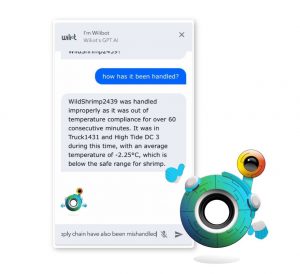Wiliot Ltd., a company that develops tiny, battery-free internet of things devices that enable data to be captured and transmitted as items traverse supply chains, is adding a generative artificial intelligence front end to its cloud analytics platform to allow customers to formulate sophisticated queries about the status and history of tracked items using natural language.
Supply chain professionals can use the WiliBot chatbot to inquire about the status of individual items and ask complex questions such as which items are the best candidates to display on the supermarket shelf based on how they were handled on the journey from manufacturer to consumer.
Wiliot’s core product, IoT Pixels, are small, low-cost, sticker-like devices that harvest energy from ambient radio frequencies such as Bluetooth, Wi-Fi and cellular signals to operate without batteries. The tags cost about 30 cents each and are expected to fall to a dime by early next year. They can sense and communicate data such as temperature, location and humidity.
The concept is similar to radio frequency identification tags dating back to the 1940s. In contrast, RFID requires an active scanning process, whereas ambient IOT constantly broadcasts the location and state of the tag. The Ambient Data Platform harvests data from the IoT Pixels to make it available to WiliBot.
That continuous information stream is useful in complex supply chains where buyers often have little visibility into how goods are handled in shipping and storage. For example, Wiliot demonstrated how a sensor on a package of shrimp could reveal that the food had been exposed to unacceptably high temperatures, where the exposure occurred and for how long.
 Freshest first
Freshest first
“Because of the sheer wealth of granular temperature and location we gather, we’re unlocking some completely new capabilities that RFID and traditional barcode traceability have not been able to do, such as identifying what is the freshest asset in a supply chain,” said Eric Casavant, director of technology marketing. “It’s turning a conventional query on its head to look at which asset was handled the best, which had the least amount of temperature excursions and which went the best possible route through the supply chain.”
Generative AI makes it possible to ask those questions in natural language rather than formulating complex queries or running business intelligence analytics.
IoT Pixels, which contain an embedded ARM processor, are typically attached to individual items or boxes of goods. Tracking and monitoring help companies improve supply chain efficiency, reduce waste, and enhance sustainability efforts.
Wiliot’s cloud-based platform collects and analyzes data from IoT Pixels to help companies make more informed decisions about inventory management, product usage and compliance with rules like the Food and Drug Administration’s Food Safety Modernization Act.
Shrinkage buster
The company said its platform could solve two-thirds of typical food shrinkage issues while ensuring a safer food supply, higher customer satisfaction and lower costs. The FDA estimates that 30% to 40% of the U.S. food supply is wasted. Wiliot’s AI and machine-learning algorithms can also identify supply chain events and automatically generate alerts or automated responses that reduce the risk of costly problems like spoilage.
“Our day-to-day business is focused on lighting up supply chains; in the future, it’ll be about end-to-end visibility filling consumers to manufacturers,” said Steve Statler, the company’s chief marketing officer.
Wiliot is piloting WiliBot with a few enterprise customers and plans a broader rollout beginning late this year. The pilot will introduce questions that traverse multiple databases such as “How fresh is this product?,” “Which product should I stock next, and why?” and “What is the carbon footprint of this product?”
Statler said that Wiliot has been working with machine learning for years and layered three types of AI into the current system. “The most visible layer is being able to have a conversational discussion with the information being gathered,” he said. “You can use a large language model as an orchestration layer that understands what it’s being asked about. A third layer at a lower level that takes hundreds of billions of radio packets and turns them into millions of events like a case of strawberries has just arrived in store number 372.”
“IoT has never fully taken off, especially RFID, which should be around us in all kinds of products,” said Constellation Research Inc. analyst Holger Mueller. “But now Wiliot wants to make products interactive, using AI and making product experiences more engaging. The AI-powered chatbot app can overcome the limits of product labeling and practically room space in products. So we will see if they can propel IoT to the next level of adoption.”
Founded in 2017, the company has raised $269 million, according to Crunchbase. Statler said that there are tens of millions of devices in the field. Customers include two largest global retailers and one of the largest public mail carriers.
With reporting from Mike Wheatley